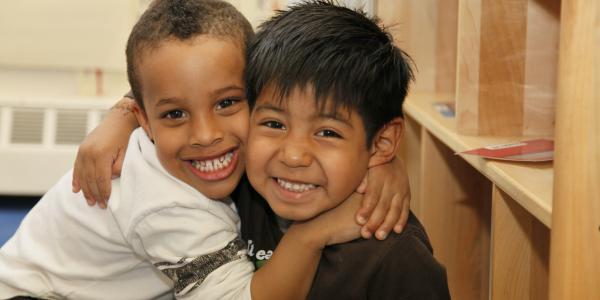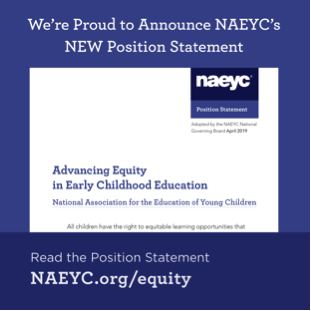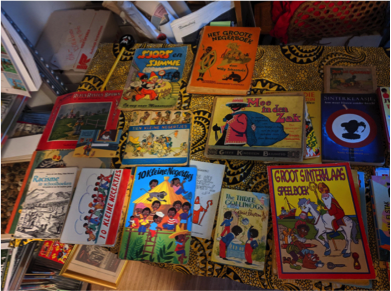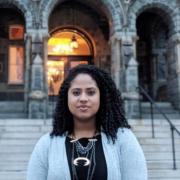Advancing Equity in Early Childhood Education: Looking Internally, Connecting Externally

“Across all roles and settings, advancing equity requires a dedication to self-reflection, a willingness to respectfully listen to others’ perspectives without interruption or defensiveness, and a commitment to continuous learning to improve practice.” — Advancing Equity in Early Childhood Education, NAEYC
While our shared commitment to global education requires us to take an expansive, outward-looking view of the world and the children, families, and educators who live it in, our work to increase equitable access to education for all young children truly begins at the individual level. Indeed, this process of being self-reflective in order to identify the ways in which each of our individual actions and beliefs impact the learning and experiences of young children in early learning settings is integral to the call to action in the National Association for the Education of Young Children’s (NAEYC) newly released Advancing Equity in Early Childhood Education position statement. The position statement is one of five foundational documents NAEYC has developed in collaboration with the early childhood profession and is grounded in NAEYC’s core values, which emphasize diversity and inclusion and respect for the dignity and worth of each individual.

The Advancing Equity in Early Childhood Education position statement challenges all of us to commit—both individually and collectively—to continuous learning. This learning needs to be based on personal reflection about how our beliefs and actions have been shaped by our experiences of the systems of privilege and oppression in which we operate, and based on respectfully listening to others’ perspectives.
If early childhood educators throughout the globe are to commit to nurturing a more diverse and inclusive generation of young children who thrive through their experiences of equitable learning opportunities in early learning programs, then this work must begin with reflection from within: Do I accept that every person holds some type of bias? How, then, have my personal background and experiences influenced my implicit and explicit biases? How have racism, sexism, classism, ableism, heterosexism, xenophobia, and other systems of oppression affected me and the people around me? How have my various social identities made me the recipient of or contributor to both injustice and privilege? The answers to these questions are critical to our work of advancing equity in early childhood education and upholding our position that all children have the right to equitable learning opportunities that enable them to achieve their full potential as engaged learners and valued members of society.
Early childhood education settings—including centers, family child care homes, and schools—are often among children’s first communities beyond their families. These settings offer important contexts for children’s learning. Early childhood educators, with the support of the early education system as a whole, can create early learning environments that equitably distribute learning opportunities by helping all children experience responsive interactions that nurture their full range of social, emotional, cognitive, physical, and linguistic abilities; that reflect and model fundamental principles of fairness and justice; and that help them accomplish the goals of anti-bias education. Educators have the ability to create environments in which children learn that they are valued by others, learn how to treat others with fairness and respect, and learn how to embrace human differences rather than ignore or fear them.[1]
...we recognize that our commitment to all children having the right to equitable learning opportunities means we must confront the complicated past and present of equity and equality in the United States while also turning beyond our borders to learn how this is advancing in other countries.
While this position statement is based on the context of early childhood education within the United States, we recognize that our commitment to all children having the right to equitable learning opportunities means we must confront the complicated past and present of equity and equality in the United States while also turning beyond our borders to learn how this is advancing in other countries. As NAEYC continues its commitment to advancing a system of high-quality early childhood education in the United States, we also work with members and partners throughout the world to engage in global partnerships, promoting and learning from innovations and opportunities in other nations.
I am personally committed to this work as a passionate advocate both for the early childhood profession and for the right of all children to have equitable learning opportunities. This work has recently brought me to a research opportunity in the Netherlands. Here, I am engaged in a practice of reflection, respectfully listening and continuously learning from early childhood educators, parents, advocates, and civic leaders. They are teaching me about ongoing efforts to center the voices and experiences of individuals of color in Dutch narratives in order to confront and dismantle racist and xenophobic systems of oppression that affect non-White Dutch citizens and residents across the country. From organizations like New Urban Collective and the Black Archives, I am learning about the unspoken history of colonialism, racism, and oppression that continues to inflict violence and injustice upon the bodies of Black and brown individuals in the country and the ways in which the education system plays a role in cementing or dismantling these structures. Learning about this work and unearthing lessons from this process, in another country, are part of my own learning and unlearning to advance equity in this field.

Part of The Black Archives’ collection of popular children’s books from past and present that depict young Black children and other children of color, often in humiliating, threatening, and/or derogatory ways.
Photo by the author.
The truth is that every country has a dark relationship with injustice and oppression in its past or present. Just as advancing equity requires us to look internally and externally, it also requires us to move ahead by looking behind. At NAEYC, we have elevated equity in areas where the domestic and international spheres align by engaging in work to protect immigrant families, for example, and to advocate for women to be valued and compensated for the important work they do on behalf of young children. As we continue to push forward in the creation of a brighter, more just future for all, I hope we, as members of the early childhood profession and field, can remain anchored by our professional obligation to advance equity and our commitment to uphold values that build on each child’s unique individual and family strengths, cultural background, language(s), abilities, and experiences. When we do this, we can eliminate differences in educational outcomes as a result of who children are, where they live, and what resources their families have. This is work NAEYC is committed to championing, and I hope you will join us in these efforts.
Author’s note: In the spirit of learning, you can find a list of definitions of terms, many of which are referenced in this post and in the advancing equity position statement, as well as others that are often used in equity discussions, on this page.
[1] This language is drawn from NAEYC (National Association for the Education of Young Children), "Advancing Equity in Early Childhood Education" (position statement, Washington, DC: NAEYC, 2019). https://www.naeyc.org/resources/position-statements/equity. You will find the complete description of NAEYC’s position on page 5.
Lucy Recio is Senior Analyst, Public Policy & Advocacy at NAEYC.
